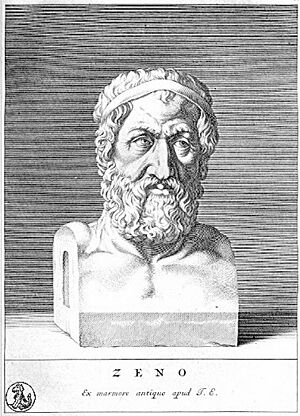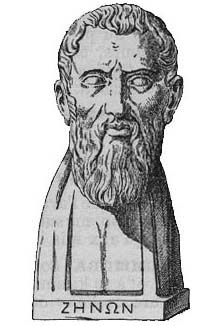Zeno facts for kids
Zeno is a name that has been used by many important people throughout history. It's also the name of some interesting ideas and places! This article will help you learn more about the different meanings of "Zeno."
Contents
Famous People Named Zeno
Many famous people have been named Zeno, often philosophers or leaders from ancient times.
Zeno (Emperor)
Zeno was an Emperor of the Eastern Roman Empire from 474 to 491 AD. This empire was also known as the Byzantine Empire. He was born around 425 AD and died in 491 AD. During his rule, he faced many challenges, including rebellions and conflicts with different groups. He is known for helping to keep the Eastern Roman Empire strong while the Western Roman Empire was falling apart.
Zeno of Citium
Zeno of Citium lived from 333 BC to 264 BC. He was a very important philosopher from ancient Greece. He founded a school of thought called Stoicism. Stoicism teaches people to be calm and strong, even when things are difficult. It encourages focusing on what you can control and accepting what you cannot. Zeno taught his students in a public walkway in Athens called the "Painted Porch," which is where the name "Stoicism" comes from (stoa means porch in Greek).
Zeno of Elea
Zeno of Elea lived around 490 BC to 430 BC. He was another important Greek philosopher. He was a student of Parmenides and is most famous for his paradoxes. A paradox is a statement that seems to contradict itself but might actually be true. Zeno's paradoxes often involved motion and how we understand it. For example, one of his most famous paradoxes suggests that if you want to walk to a wall, you first have to walk half the distance, then half of the remaining distance, and so on, meaning you would never actually reach the wall! These paradoxes made people think deeply about space, time, and movement.
Zeno of Sidon
Zeno of Sidon was an Epicurean philosopher who lived in the first century BC. Epicureanism was another school of thought in ancient Greece that focused on finding happiness and peace through simple pleasures and avoiding pain.
Zeno of Tarsus
Zeno of Tarsus was a Middle Stoa philosopher who lived in the third century BC. He followed the teachings of Stoicism, like Zeno of Citium, but was part of a later period of this philosophy.
Saint Zeno of Verona
Saint Zeno of Verona lived around 300 AD to 380 AD. He was a Roman Catholic Saint and an early Christian Bishop. He is known for being a protector of fishermen and for his wisdom.
Zeno Brothers
The Zeno brothers were Antonio, Carlo, and Nicolò Zeno. They were Venetian navigators who lived in the fourteenth century. They are known for their voyages and for a map that was published later, called the Zeno map. This map showed parts of the North Atlantic Ocean.
Nicolò Zeno (younger)
Nicolò Zeno the younger was the person who published the Zeno map. He was a descendant of the original Zeno brothers and helped share their voyages with the world.
Other Things Named Zeno
The name Zeno isn't just for people! It's also used for other interesting things.
Zeno's Paradoxes
As mentioned earlier, Zeno's paradoxes are a set of challenging problems created by Zeno of Elea. They are famous for making us think about how we understand motion, time, and space. They show how tricky it can be to explain things that seem simple at first glance.
Zeno (Crater)
Zeno (crater) is a lunar impact crater. This means it's a big bowl-shaped hole on the Moon's surface, created when something like an asteroid or comet crashed into it. It's named after Zeno of Citium.
Zeno Programming Language
The Zeno programming language is a type of computer language designed to be easy to learn and use. It's an imperative procedural language, which means it gives the computer a set of step-by-step instructions to follow.
Quantum Zeno Effect
The Quantum Zeno effect is a fascinating idea in quantum mechanics, which is the science that studies very tiny particles. It suggests that if you constantly observe a quantum system, you can actually slow down or even stop its natural changes or decay. It's like "watching a pot" so closely that it "never boils" in the quantum world!
Related pages
- Xeno
See also
 In Spanish: Zeno para niños
In Spanish: Zeno para niños
 | Emma Amos |
 | Edward Mitchell Bannister |
 | Larry D. Alexander |
 | Ernie Barnes |



